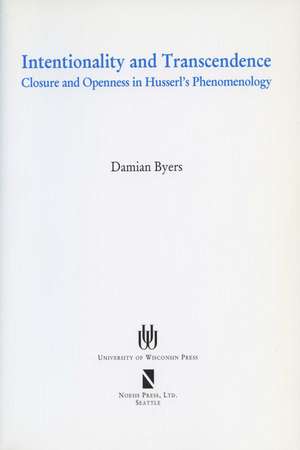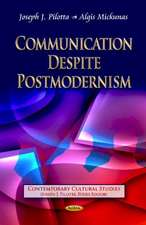Intentionality And Transcendence: Closure And Openness In Husserl'S Phenomonoloy
Autor Damian Byersen Limba Engleză Paperback – 23 oct 2003
Damian Byers analyzes the form Husserl gives to the problem of knowledge—the way this form influences the development of the phenomenological method, and the results of its application. In a very clear fashion, Byers presents Husserl’s understanding of the roles of intentionality, idealism, temporalization, and kinesthesia in the constitution of knowledge. Drawing upon all of Husserl’s major texts, he corrects many misapprehensions about Husserl’s doctrines of intentionality and idealism. Byers argues that Husserl’s transcendental phenomenology is both a philosophy of closure and control and a philosophy of openness and vulnerability.
Preț: 209.97 lei
Nou
Puncte Express: 315
Preț estimativ în valută:
40.18€ • 42.05$ • 33.44£
40.18€ • 42.05$ • 33.44£
Carte disponibilă
Livrare economică 10-24 martie
Preluare comenzi: 021 569.72.76
Specificații
ISBN-13: 9780299188542
ISBN-10: 029918854X
Pagini: 232
Dimensiuni: 178 x 235 x 18 mm
Greutate: 0.44 kg
Ediția:1
Editura: University of Wisconsin Press
Colecția University of Wisconsin Press
ISBN-10: 029918854X
Pagini: 232
Dimensiuni: 178 x 235 x 18 mm
Greutate: 0.44 kg
Ediția:1
Editura: University of Wisconsin Press
Colecția University of Wisconsin Press
Recenzii
"The best book on intentionality and transcendence in Husserl that I have read. . . . It will undoubtedly become the standard reference work in the field."—James R. Mensch, St. Francis Xavier University
Notă biografică
Damian Byers is a fellow in the department of Philosophy, University of Melbourne, Australia.
Descriere
Damian Byers analyzes the form Husserl gives to the problem of knowledge—the way this form influences the development of the phenomenological method, and the results of its application. In a very clear fashion, Byers presents Husserl’s understanding of the roles of intentionality, idealism, temporalization, and kinesthesia in the constitution of knowledge. Drawing upon all of Husserl’s major texts, he corrects many misapprehensions about Husserl’s doctrines of intentionality and idealism. Byers argues that Husserl’s transcendental phenomenology is both a philosophy of closure and control and a philosophy of openness and vulnerability.
















